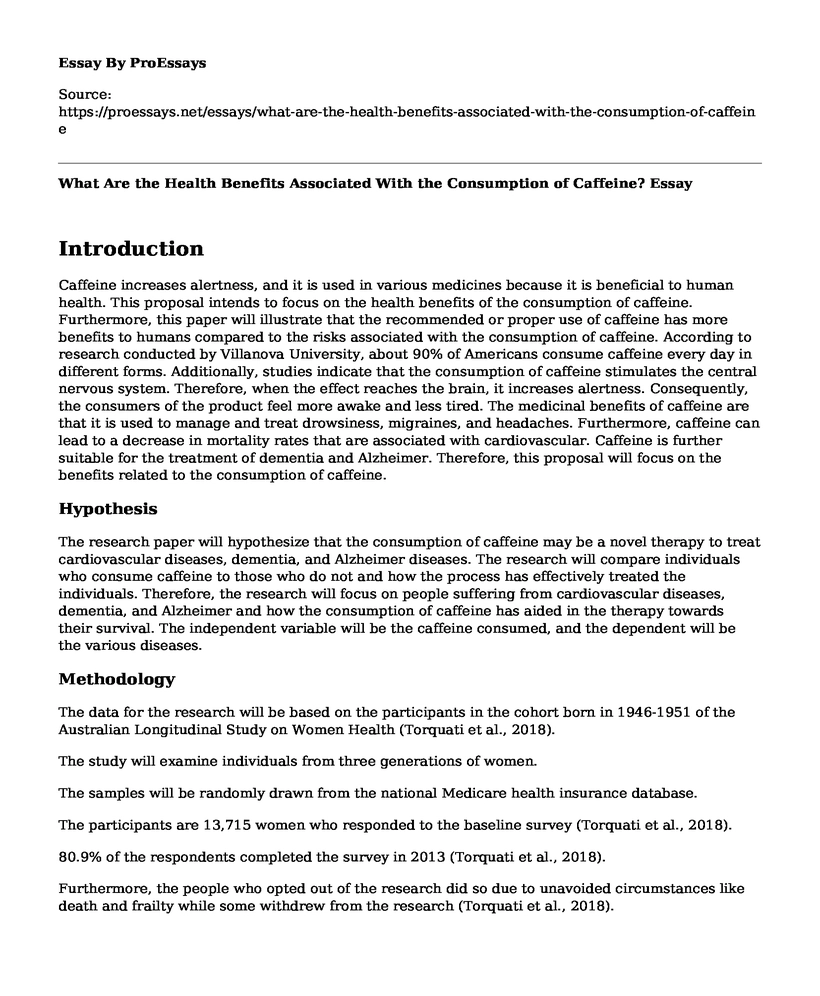Introduction
Caffeine increases alertness, and it is used in various medicines because it is beneficial to human health. This proposal intends to focus on the health benefits of the consumption of caffeine. Furthermore, this paper will illustrate that the recommended or proper use of caffeine has more benefits to humans compared to the risks associated with the consumption of caffeine. According to research conducted by Villanova University, about 90% of Americans consume caffeine every day in different forms. Additionally, studies indicate that the consumption of caffeine stimulates the central nervous system. Therefore, when the effect reaches the brain, it increases alertness. Consequently, the consumers of the product feel more awake and less tired. The medicinal benefits of caffeine are that it is used to manage and treat drowsiness, migraines, and headaches. Furthermore, caffeine can lead to a decrease in mortality rates that are associated with cardiovascular. Caffeine is further suitable for the treatment of dementia and Alzheimer. Therefore, this proposal will focus on the benefits related to the consumption of caffeine.
Hypothesis
The research paper will hypothesize that the consumption of caffeine may be a novel therapy to treat cardiovascular diseases, dementia, and Alzheimer diseases. The research will compare individuals who consume caffeine to those who do not and how the process has effectively treated the individuals. Therefore, the research will focus on people suffering from cardiovascular diseases, dementia, and Alzheimer and how the consumption of caffeine has aided in the therapy towards their survival. The independent variable will be the caffeine consumed, and the dependent will be the various diseases.
Methodology
The data for the research will be based on the participants in the cohort born in 1946-1951 of the Australian Longitudinal Study on Women Health (Torquati et al., 2018).
The study will examine individuals from three generations of women.
The samples will be randomly drawn from the national Medicare health insurance database.
The participants are 13,715 women who responded to the baseline survey (Torquati et al., 2018).
80.9% of the respondents completed the survey in 2013 (Torquati et al., 2018).
Furthermore, the people who opted out of the research did so due to unavoided circumstances like death and frailty while some withdrew from the research (Torquati et al., 2018).
The research assessed the physical and general health of the participants based on caffeine consumption.
Reference
Torquati, L., Peeters, G., Brown, W., & Skinner, T. (2018). A Daily Cup of Tea or Coffee May Keep You Moving: Association between Tea and Coffee Consumption and Physical Activity. International journal of environmental research and public health, 15(9), 1812.
Cite this page
What Are the Health Benefits Associated With the Consumption of Caffeine?. (2022, Oct 03). Retrieved from https://proessays.net/essays/what-are-the-health-benefits-associated-with-the-consumption-of-caffeine
If you are the original author of this essay and no longer wish to have it published on the ProEssays website, please click below to request its removal:
- Background of Speech Delay in Toddlers - Research Paper Sample
- Public Policy on Health Essay
- Annotated Bibliography: Teenage Obesity
- Nutrition Reflection Paper Example
- Paper Example on U.S. vs. Canada: Comparing Health Care Cost and Quality
- Hip Replacement: Surgery, Anaesthesia & Health Factors - Essay Sample
- Paper Sample on Study Q: Does Zona Genes/mRNA Affect Oocyte Info Revelation?







